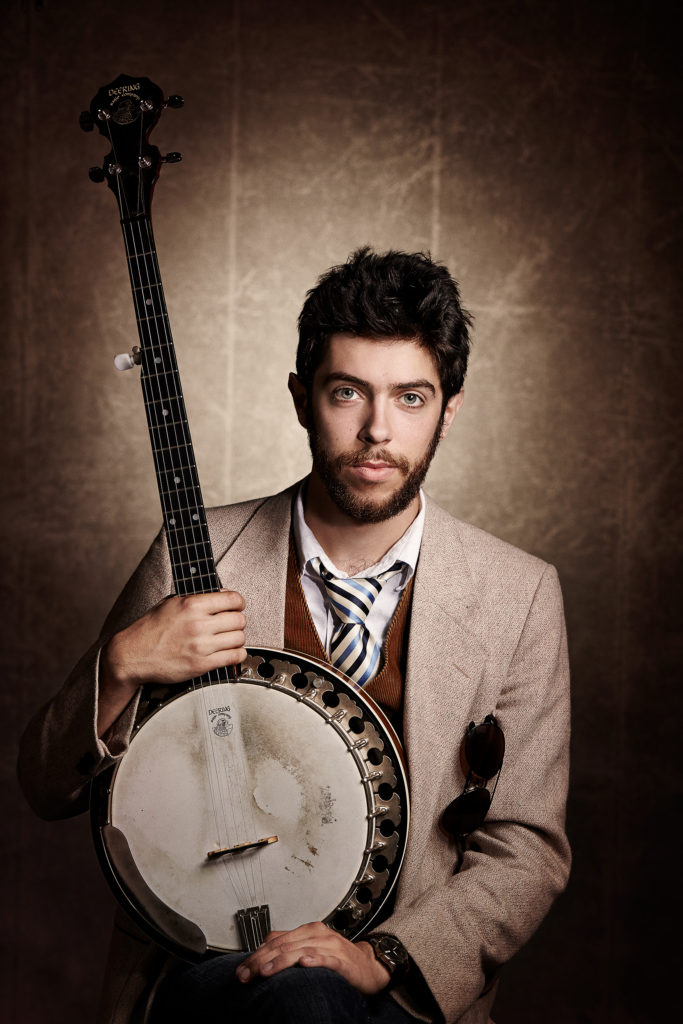
Two years ago, an English professor told us that Logan Metz ’10, a singer/songwriter in a rock band that was making the rounds and becoming known in L.A.’s club scene, was among her best Shakespeare students ever. When we learned the Metz’s musical turf was that fertile soil where folk, country, blues and rock co-mingle, we said, “If he combines the Great Playwright with a genre steeped in human stories, then we have to ask him write about that.”—The Editor
Research into Shakespeare’s effect on pop music is relatively uncharted territory, which may be what first attracted me to the notion. The few published materials on the subject vaguely concede that the Bard and a beat ought to get along. But none seem quite sure there is anything more to note on the matter. In the end, most resort to a copious list of ’50s songs that reference “Romeo and Juliet.”
By no measure do I qualify as a Shakespearean scholar. I took my first college Shakespeare class in the fall of my senior year at LMU with Prof. Theresia de Vroom, who made an Elizabethan addict out of me by the end of her first lecture. Soon thereafter, I resolved to shirk my remaining screenwriting classes and focus on graduating with a fairly solid understanding of the Bard’s Greatest Hits. With this résumé I do not foresee contributing any instrumental new theories to the world of literary scholarship, so lately I have shifted my sights from an academic study of Shakespeare in music to the inverse field — a musical study of Shakespearean academia.
It began when Prof. de Vroom, perhaps surmising by my appearance that I was a musician, offered me a chance to compose a song in lieu of a final paper. Inspired by “King Lear,” I tinkered around with a woebegone country number about a father disowning his daughter, but felt I was merely reducing the play to a one-dimensional plot summary. If this song was to be graded amid dozens of college Shakespeare papers, it would have to fulfill the same criteria: maintaining a logical structure, displaying sound comprehension of the plays, observing patterns in language, referencing applicable quotes, and so on. The only difference between my classmates’ assignment and my own, I suddenly realized, was medium. I called for backup, and soon fellow songwriter Lincoln Mendell ’10 and I were attempting to persuade music to operate in a new way — as an avenue not only of adaptation, but analysis.
At the least, studying great storytellers and their expressions of human nature has uncovered a bottomless reservoir of songwriting material.
With its reconsidered function, the song began interacting with the “Complete Works” almost on its own. When we needed a device to represent the destruction of a family, we simply asked Shakespeare. “Useth a shipwreck as metaphor,” he said, so we wrote a sea shanty that quotes the opening scene of “The Tempest.” In examining Lear’s madness, Master Will advised, “Maketh it stormy. Choppy. Erratic,” so we fused crooked time signatures, dissonant chords and jarring changes. And when it came time to compose a musical manifestation of the moment of death, “Well, it’s hard to explain,” he said. “It would probably be best if thou just used mine own lyrics. Checketh out ‘Cymbeline.” The final paper became a 10-minute, five-act suite, and I passed the class.
The end of the semester, though, did not mark the end of the project. For a brief period, we sought a generous pope or a wealthy earl who was accepting applications for his patronage, but that plan fell through. Eventually, a small grant helped to fund both the commissioning of a string quartet accompaniment and the studio time to record the operetta with our own rock ‘n’ roll band. The finished product will be published in spring 2012 along with a supplemental book and color illustrations. The only remaining question is the one that haunts all works of art: What’s the use?
The suite’s awkward suspension somewhere between pop music and literary theory probably renders it unmarketable in both realms. Perhaps, like most art, it is its own purpose, or perhaps there is some practical educational value to be discovered within the general concept of Book Rock. At the least, studying great storytellers and their expressions of human nature has uncovered a bottomless reservoir of songwriting material. And if ever I cease to be inspired by Shakespeare the poet, I’ll simply think of Shakespeare the person, wandering alone the plague-infested, sewage-filled streets of London and finding a world worth writing about.
Logan Metz ’10 is a musician and songwriter for the Reflectacles, which he helped form as a student at LMU. His major was screenwriting, and he minored in philosophy. Metz plays five instruments and began writing songs as a boy. “The earliest song I remember writing was when I was about 11,” Metz said. “Something about coffee, heartbreak, and other things I had yet to experience.” Joining Metz in the Reflectacles are Gerry Hirschfeld ’09, Devin McCarty ’09, Lincoln Mendell ’09, Chris Bullard and Anthony Sonetti. A Reflectacles EP is available at the iTunes Store.
